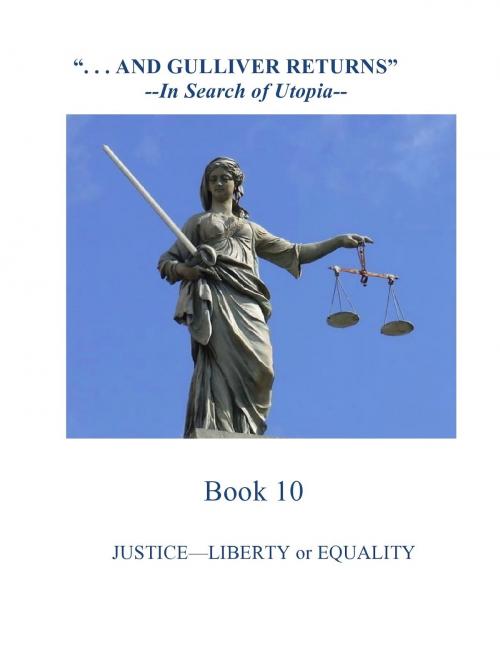Justice: Liberty or Equality
Nonfiction, Social & Cultural Studies, Political Science, Government, Democracy| Author: | Total Health Publications | ISBN: | 9781301462803 |
| Publisher: | Total Health Publications | Publication: | August 22, 2012 |
| Imprint: | Smashwords Edition | Language: | English |
| Author: | Total Health Publications |
| ISBN: | 9781301462803 |
| Publisher: | Total Health Publications |
| Publication: | August 22, 2012 |
| Imprint: | Smashwords Edition |
| Language: | English |
After visiting The Colonies, the libertarian paradise, Commander. Gulliver and his friends meet a professor to talk about what is justice for a society. The ideas of justice rest on the three basic assumptions for our values as discussed in book 4. But another continuum needs to be addressed when looking at justice in a society. This deals with the equality to liberty continuum. The first question to discuss is whether or not we humans are equal or unequal. If we are equal then equality should be shown throughout the society, including the equality of wages or economic equality. If we are not equal then we should have the freedom, the liberty, to achieve to whatever levels we desire––including financial liberty.
Revolutionaries generally emphasize equality. The citizens believe they are equal to the kings and the cardinals. As America’s Declaration of Independence stated “All men are created equal.” But after the revolution the constitutions written almost universally emphasize liberty–– the freedom to vote, to stand equally before the law and possibly for equality of opportunity. In discussing the issues it was found that evidence for equality and inequality can be found in the Scriptures and the writings of theologians. From a non-theistic basis, equality was seen by Hobbes as the fact that anyone has the power to kill another. For that reason he thought we should have a monarchy to protect us from each other. But John Dewey, while admitting that people are not equal, saw equality as an ideal because it is essential in a Democratic society.
The European nations tend to believe in equality and run their societies along equalitarian lines. The US is much more geared to recognizing the inequality of people and allowing for economic liberty. The rich are getting richer and the poor are getting poorer. But most Americans don't recognize the extent of their poverty when compared to the rich in America or to the average citizens in Scandinavia.
After visiting The Colonies, the libertarian paradise, Commander. Gulliver and his friends meet a professor to talk about what is justice for a society. The ideas of justice rest on the three basic assumptions for our values as discussed in book 4. But another continuum needs to be addressed when looking at justice in a society. This deals with the equality to liberty continuum. The first question to discuss is whether or not we humans are equal or unequal. If we are equal then equality should be shown throughout the society, including the equality of wages or economic equality. If we are not equal then we should have the freedom, the liberty, to achieve to whatever levels we desire––including financial liberty.
Revolutionaries generally emphasize equality. The citizens believe they are equal to the kings and the cardinals. As America’s Declaration of Independence stated “All men are created equal.” But after the revolution the constitutions written almost universally emphasize liberty–– the freedom to vote, to stand equally before the law and possibly for equality of opportunity. In discussing the issues it was found that evidence for equality and inequality can be found in the Scriptures and the writings of theologians. From a non-theistic basis, equality was seen by Hobbes as the fact that anyone has the power to kill another. For that reason he thought we should have a monarchy to protect us from each other. But John Dewey, while admitting that people are not equal, saw equality as an ideal because it is essential in a Democratic society.
The European nations tend to believe in equality and run their societies along equalitarian lines. The US is much more geared to recognizing the inequality of people and allowing for economic liberty. The rich are getting richer and the poor are getting poorer. But most Americans don't recognize the extent of their poverty when compared to the rich in America or to the average citizens in Scandinavia.















